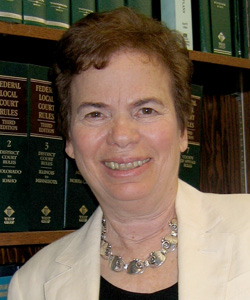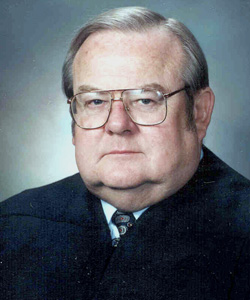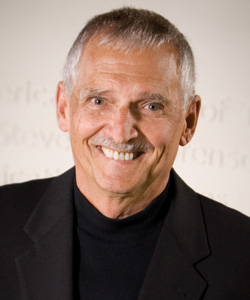Don't Miss Photos of the 50-year Celebration on the State Bar's Facebook Page
The State Bar recognized 50-year members of the profession May 15 at a luncheon in Delafield. Check out the State Bar's Facebook page view photos of the event.
May 16, 2012 – Louise Trubek isn’t afraid to stick her neck out and take chances. Fifty years ago, she entered a male-dominated legal profession determined to advance social justice. Since then, she has become a powerful voice for citizens in Wisconsin and beyond.
“I was part of the great change,” said Trubek (Yale Law School 1960), noting that more women began to enter the labor force, and law school, in the late 1960s.
Trubek, a clinical emeritus professor at U.W. Law School and founder of the school’s Center for Public Representation, is one of many Wisconsin lawyers celebrating 50 years in the profession with first bar admission in 1962. While some have retired, Trubek is still going strong.
Now living in Brooklyn, her native city, she’s an adjunct professor at Seton Hall University Law School and a prolific academic writer on poverty law, health law, and global social justice. And her leadership on issues like women’s rights is still very much in play.
Recently, she published a New York Times Op-Ed piece, “The Unfinished Fight Over Contraception,” advancing a woman’s right to control her own fertility.
In it, Trubek explains how she joined a lawsuit in the late 1950s challenging a Connecticut law that, among other things, prohibited doctors from prescribing birth control to married women. She wanted to help ensure the freedom of women to choose the timing of child birth.
“I was always interested in the law as an instrument for social change,” said Trubek, who came from a working class background and vowed to help people who struggled economically.

Louise Trubek was always interested in the law as an instrument of change.
A Life in Public Interest
“New woman lawyer arrives in town” was a headline that appeared in the Capital Times newspaper in 1973, announcing Trubek’s arrival to Madison. It was an article urged by now-Wisconsin Supreme Court Chief Justice Shirley Abrahamson, Trubek says.
“Shirley [Abrahamson], on the law faculty at the time, was interested in promoting women in the bar, and she was interested in the public interest law firm that I was setting up,” said Trubek, a champion for helping women achieve both career and family goals.
By all accounts, it was Trubek’s re-arrival, having attended the University of Wisconsin at Madison (1953-57) as a determined high school student from New York City.
At 16 years old, Trubek attended college through an early admission program funded by the Ford Foundation. Known as the “Ford Boys and Girls,” the program placed extraordinary young high school students in various participating colleges and universities, including U.W.-Madison.
There, she met her soon-to-be husband, David Trubek. Both went on to Yale Law School, and Louise was admitted to the Connecticut Bar in 1962. Eventually, after family stints in Washington D.C., New Haven, and Brazil, David Trubek took at teaching position at U.W. Law School. Now with three kids, the Trubek family returned to Madison in 1973.
The law school hired Louise, who had worked for the American Civil Liberties Union and a private-public interest law firm in New Haven, to create the Center for Public Representation, a teaching clinic and public interest law firm that would serve Wisconsin citizens.
The center opened its doors in 1974. Louise served as executive director from 1973 to 1992, and as clinical director-senior attorney from 1992 to 2002. The center filled a representation gap, but also worked on policy addressing issues like women’s rights, environmental, and health issues.
In 2002, the center was renamed the Economic Justice Institute (EJI). An extension of the Center for Representation, the nonprofit maintains several anti-poverty clinical programs assisting clients in different areas like consumer law, family law, and domestic violence.
“Louise’s work provided a foundation for what EJI and a lot of other public interest programs are doing now,” said Marsha Mansfield, a clinical professor of law at U.W. Law School and director of EJI. “She was the leader in terms of her efforts to make public interest law important, to educate people, and to advocate for underserved populations.”
EJI, which is celebrating its 10-year anniversary at a celebration and fundraising event on June 15 at Heritage Hall at Camp Randall, will present Trubek with a Founder’s Award to recognize her contributions to the school’s public interest law tradition.
During the course of her career, Trubek collected numerous awards, including the 2000 Marygold Melli Achievement Award for significant contributions to women in the law, presented by the Legal Association for Women. In 1994, she was named one of the 10 most influential people of the past decade by Milwaukee Magazine.
With no plans to retire, Trubek focuses on academic writing in the health law area, and teaches health law classes at Seton Hall Law School in New Jersey. She’s also working on a global public interest law publication with the Law and Society Association, forthcoming in the Wisconsin International Law Journal.
“I still enjoy the work. And even though I’ve moved away, I continue to work with people in Wisconsin and feel very connected to the issues and people there, including former students,” she said. “Many of the people I worked with in those early days are still active in that community.”

Hon. Harold Froelich served 30 years as an Outagamie County circuit court judge, but got his start as a politician.
Froehlich Involved in Historic Politics Before His Tenure on the Bench
The Hon. Harold Froehlich, who graduated from U.W. Law School in 1962, served 30 years as circuit court judge in Outagamie County. But he got his start as a politician.
In fact, Froehlich ran for the Wisconsin Assembly in 1958 when he was still in college at U.W.-Madison, after serving four years in the U.S. Navy. He lost, but ran again after law school.
“I saw that most legislators in U.S. Congress were lawyers,” said Froehlich, who won a seat in the Wisconsin Assembly in 1962. “I decided that studying law would help me, and it did.”
During his 10-year tenure in the Wisconsin Legislature, and while in his 30s, Froehlich (R-Appleton) was voted minority party chairman (1965-67). When Republicans gained control of the Assembly in 1967, he became speaker (1967-71). He was 35 years old.
“I really enjoyed being involved in legislation,” he said, noting several bills he helped craft, including one that gave merchants the authority to have parked cars towed to make room for customers. “The whole political process was fascinating to me. I really enjoyed helping local constituents solve problems.”
Current Wisconsin Supreme Court Justice David Prosser, a former member and speaker of the Wisconsin Assembly, said Froehlich “was responsible for modernizing the Wisconsin Legislature … and championing the growth and professionalism of the legislative agencies.”
Ten years later, in 1972, Froehlich ran for a seat on the U.S. House of Representatives and won, leaving state politics and selling his interest in a five-lawyer firm in Appleton.
Froehlich was appointed to the U.S. House Judiciary Committee, and was one of six Republicans on the committee who voted to impeach President Richard Nixon on July 30, 1974. The U.S. House confirmed Gerald Ford as Vice President, who later became President.
“I made my decision based on the facts as I saw them,” said Froehlich, recalling the impeachment vote. “Then we voted in Ford. I’ll never forget those historic events.”
Between a nationwide recession and the Watergate scandal, 45 Republicans lost their seats in the 1974 election, Froehlich said. “I was one of them.”
Froehlich, who ran and lost again in 1976, practiced law in Wisconsin until then-Wisconsin Gov. Lee Dreyfus appointed him to circuit court bench in 1981, a post he held until his retirement in 2011. In 1999, he was named Judge of the Year by the State Bar’s Bench and Bar Committee.
John Teetaert, one of many lawyers who nominated Froehlich in 1999, said he “shines as the workhorse of the judiciary and a spokesman for the circuit court branch of government.”
“Like legislators, judges are there to help solve problems, and I enjoyed that aspect of it,” said Froehlich, whose son, Jeffrey Froehlich, is now a circuit judge in Calumet County.

Tom Basting is following in his mentors’ footsteps – using his talents and experience to give back to the community.
Early Lesson Guides Basting Through Successful Career
Tom Basting (U.W. 1962) remembers using a typewriter in 1962 to correspond with clients and other lawyers after settling into private practice at a small Janesville law firm.
Now in his 50th year as a Wisconsin lawyer, Basting says times have certainly changed. “We’ve certainly come a long way from the days of the ‘carbon copy,’” Basting said. “I can remember all of us being fascinated with IBM’s Selectric typewriter, and later, fax machines.”
Basting, who helped Brennan, Steil & Basting S.C. grow from four lawyers to 20-plus during a 43-year career, now provides mediation and arbitration services at Midwest Mediation LLC, a firm he started with former Dane County Circuit Court Judges Gerald Nichol and Daniel Moeser.
He says technology has moved rapidly, but the oath that attorneys take remains the same.
Asked about a significant event in his career, the former State Bar of Wisconsin President (2007-08) recalled an early lesson about zealous representation. In the late 1960s, when public defenders did not exist, Basting picked up a first-degree murder case.
The defendant, who had killed his wife at a college campus in Janesville, was convicted on a first-degree murder charge. But Basting believed his client didn’t get a fair shake.
On appeal, Basting fought for and won a new trial. The second jury found his client guilty on the lesser charge of second-degree murder, with a lesser degree of punishment.
“In a small community like Janesville, people had a difficult time understanding how a lawyer could actually defend an alleged criminal who had killed his wife,” Basting said. “I became a bit of a pariah in the community because I had done what lawyers are supposed to do, and that is defend people accused of crimes regardless of how heinous they may be.”
That early lesson, Basting says, helped him become a stronger lawyer. “You do what you are charged with doing regardless of how the community may view you,” he said.
Basting went on to a successful career. His firm helped represent the state of Wisconsin against tobacco manufacturers in the late 1990s, which settled for billions, and led to new laws related to the dangers of tobacco use. He also served as retained counsel to the Office of Lawyer Regulation, the Wisconsin Judicial Commission, and the Wisconsin Ethics Board.
He left his Janesville law firm in 2005, started Midwest Mediation LLC, and embarked on other journeys. In 2007, he became the State Bar’s 52nd president at the age of 70, focusing his efforts on the unmet legal needs of low-income individuals, the unauthorized practice of law and the protection of consumers, and judicial campaign reform.
Basting credits lawyers like Glen Campbell and George Steil Sr., now both deceased, for the mentorship they provided. In the twilight of his career, Basting is still following their footsteps.
“I’m now doing many of the things George did later in his career. Since I’ve retired from the firm, I’ve decided that the best thing for me to do is to give back to the community as much as I can, using the talents and experience I’ve acquired,” Basting said.
Currently, Basting serves on the board of directors for the U.W. Hospitals and Clinics Authority, he chairs the audit committee of U.W. Hospitals, and he’s vice president of the Overture Center Foundation, which helps fund the performing arts center, among other activities.
50-year Lawyers Honored May 15
Many 50-year members of the profession were formally recognized for their service at State Bar of Wisconsin’s 50-year Member Recognition Luncheon May 15 at the Delafield Hotel.
Also, an article in the last edition of WisBar InsideTrack featured two other 50-year lawyers, Gerald Boyle and E. Michael McCann. If you missed it, here’s the link:
Finally, the State Bar congratulates the following State Bar members who were admitted to practice law in 1962:
F. Thomas Ament, Wauwatosa
Thomas E. Anderson, Cross Plains
John P. Arakelian, Milwaukee
Albert J. Armonda, Burlington
John A. Bach, Thiensville
James F. Bakken, Madison
Thomas J. Basting Sr., Madison
Howard S. Bellman, Madison
Marshall R. Berkoff, Milwaukee
Joseph M. Bernstein, Milwaukee
Thomas W. Bertz, Stevens Point
Gerald P. Boyle, Milwaukee
Stuart M. Brafman, Chevy Chase, Md.
Kirby E. Brant, Madison
Curtis Brewer, Oconomowoc
George A. Brumder, Los Angeles
Gerald L. Buckley Jr., Green Bay
Ralph W. Bushnell, Madison
Karl J. Canavesi, Rockford, Ill.
John C. Carlson, Middleton
Wayne F. Caskey, Dallas
John T. Chapman, Brainerd, Minn.
Myron M. Cherry, Chicago
John E. Clarke, Madison
James L. Cummings, Neenah
George W. Curtis Jr., Oshkosh
Roger Y. Dewa, Honolulu
Leonard Dubin, Northridge, Calif.
Phillip J. Eckert, West Bend
James J. Ermert, Racine
Allen J. Fagel, Chicago
David C. Farr, Eau Claire
Donald J. Fluegel, Hastings, Minn.
Jerome Foreman, Highland Park, Ill.
Robert H. Friebert, Milwaukee
Gerald L. Friedman, Greenwich, Conn.
Hon. Harold V. Froehlich, Appleton
Henry C. Fuller, Rosholt
John B. Furay, Los Angeles
Harry L. Garwood, Haines City, Fla.
Harold D. Gehrke, Shorewood
Fred E. Gratke, Philadelphia
Emanuel V. Gumina, Greendale
Eric Hagerup, Baltimore, Md.
David B. Halling, Mequon
Olivia W. Hansen, Mequon
Lawrence I. Hanson, Middleton
James C. Hartwig, Fox Point
M. Paul Hendrickson, Holmen
C. Vernon Howard Jr., Madison
Eugene Hutchinson, Chicago
Robert L. Jackson Jr., Milwaukee
George F. Jacobs Jr., Madison
John R. Jacobs, Saint Paul, Minn.
Thomas M. Jacobson, Milwaukee
Leon E. Jensen, Appleton
Donald L. Johnson, Chicago
Joseph P. Jordan, Toledo, Ohio
Allan Jay Joseph, San Francisco
Richard J. Kamps, Marshfield
Myron B. Katz, Milwaukee
Hon. Robert A P Kennedy, Crandon
Donald E. Knapp, Newark, N.J.
William A. Knoeller, Alexandria, Va.
Donald J. Kraemer, Diamondhead, Miss.
Richard J. Kreul, Racine
Carl Krueger, Menomonee Falls
Hon. Daniel L. La Rocque, Madison |
Frederick A. Lake, Kalamazoo, Mich.
Earle Lambert, Encino, Calif.
C. William Lengacher, Alexandria, Va.
Douglas H. Lenicheck, Wauwatosa
Nathaniel S. Lepp, Kenosha
James S. Levin, Milwaukee
Robert S. Lindgren, Houston, Texas
Scott V. Lowry, Port Charlotte, Fla.
Charles R. Lund, Wauwatosa
Donald W. MacDonald, Milwaukee
Edward A Markus Jr., River Forest, Ill.
Harry B. Maroney II, Madison
John J. McCabe Jr., Thousand Oaks, Calif.
Edward M. McCann, Milwaukee
William E. McCarty, Saint George, Utah
Hon. Richard B. McConnell, Knoxville, Texas
James D. McWilliams, Oakland, Calif.
Robert E. Meldman, Milwaukee
Dale N. Miracle, Elm Grove
Arthur M. Moglowsky, Milwaukee
David M. Monson, Racine
Charles C. Mulcahy, Milwaukee
Donald R. Murphy, Madison
Barry Musgrove, Sterling, Ill.
John A. Neupert, Lake Mills
Frank E. Niesen, Austin, Texas
Kenneth G. Ogie, Milwaukee
Richard M. Olk, Antigo
Paul A. Pakalski, St. Pete Beach, Fla.
Jack W. Patrick, Menomonee Falls
Michael E. Phenner, Chicago
Joseph F. Preloznik, ldwood, Fla.
Paul Joseph Proteau, Riverside, Ill.
Hon. Robert W. Radcliffe, Black River Falls
T. J. Ralph, San Antonio
Hon. C A. Richards, Hudson
Herman C. Runge Jr., Collinsville, Ill.
Herman D. Schacht, Beaver Dam
Warren M. Schmidt, Brooklyn
William E. Schwarz, Wauwatosa
Robert K. Scott, Barrington, Ill.
John L. Sellstrom, Jamestown, N.Y.
William M. Shernoff. Claremont, Calif.
Robert M. Sigman, Appleton
James B. Sloan, Chicago
Ronald P. Sokol, Puyricard, France
Gerald M. Stein, Thiensville
William J. Sullivan, Alexandria, Va.
Robert W. Swain Jr., Appleton
Samuel T. Swansen, Philadelphia
Donald S. Taitelman, Milwaukee
Louise G. Trubek, Madison
Kent J. Vana, Ada, Mich.
Michael R. Vaughan, Madison
Clarence H. Veit, Oakland, Calif.
Douglas J. Wadsworth, Madison
Roger E. Walsh, Milwaukee
Ruth J. Weber, Appleton
Peter Weiss, Edina, Minn.
David C. Wilcox Jr., Kingman, Ariz.
John F. Wilcox, Eau Claire
Hon. Joseph E. Wimmer, Waukesha
Richard T. Winter, Antigo
Alfred L. Wolff, Reston, Va.
Harry F. Worth Jr., Broomfield, Colo.
John G. Wylie, Appleton
Keith A. Yelinek, Madison
Stephen E. Zwicky, Evansville |
